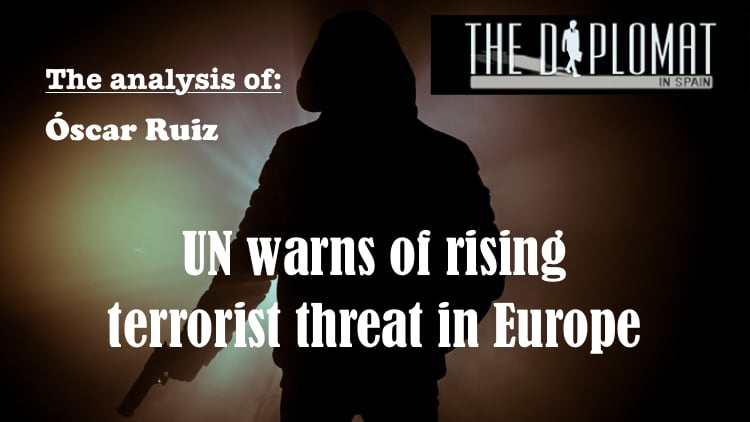SUMMARY
The terrorist threat from al-Qaeda, the Daesh group and its affiliates remains high in conflict zones in Africa and Afghanistan, and is increasing in Europe.
Óscar Ruiz / Escudo Digital
A United Nations panel of experts has just issued a report stating that the terrorist threat from al-Qaeda, the Daesh group and its affiliates remains high in conflict zones in Africa and Afghanistan, and threat levels have increased in some regions, including Europe.
The expert group noted in the 23-page report that the relationship between Afghanistan’s Taliban rulers and al-Qaida remains close, and other states not named by the UN report that “the high concentration of terrorist groups” in the country is undermining the security situation in the region.
In Afghanistan, the greatest threat remains from Daesh “with its ability to project itself into the region and beyond”, the experts said in the report to the UN Security Council covering the period from 2023 to 16 December. Also in Asia, at the regional level, they noted a succession of attacks in neighbouring Iran and Pakistan and threats in Central Asian nations.
However, the panel said that while none of the al-Qaida-affiliated groups have regained the ability to launch long-range operations, they do “harbour global ambitions”. And “covert and calibrated efforts to rebuild these outreach capabilities” have been reported.
The Daesh group split from al-Qaida more than a decade ago and attracted followers from around the world. Despite its defeat in Iraq in 2017 and Syria two years later, the panel says Daesh’s combined strength in the two countries remains between 3,000 and 5,000 fighters. In Iraq, they would be conducting “a low-intensity insurgency with covert terrorist cells” while in Syria attacks have intensified since November, experts said.
The panel confirmed that the three-month delay in appointing a new Daesh leader, Abu Hafs al-Hashemi al-Qurayshi, following the death in combat of his predecessor “is considered indicative of internal difficulties and security challenges for the terrorist group”.
Some UN member states have noted that the heavy pressure of counter-terrorism operations in Syria and Iraq could raise the possibility that the Islamic State could shift its leadership and “centre of gravity” to Africa or Afghanistan, with Africa being more likely, experts said.
In West Africa and the Sahel, according to the UN report, “violence and threats have again escalated” in conflict zones, causing concern in the affected countries, but also in their immediate neighbours. The experts also point out that in these countries there is “a deficit in counter-terrorism capabilities”, which Daesh and al-Qaeda affiliated groups continue to exploit. Moreover, according to the UN report, “The situation is becoming increasingly complex with the confluence of ethnic and regional disputes on the one hand, as well as the agenda and operations of these groups”.
In East Africa, the UN panel explains that the Somali government continues its military offensive against al-Shabab, an al-Qaeda affiliate, but says that despite significant losses from air strikes and military operations, “al-Shabab remains resilient”. It has an estimated 7,000 to 12,000 fighters, and an estimated annual income of $100 million, mainly from illegal taxes in the capital Mogadishu and southern Somalia.
However, much has changed following the Hamas attacks on 7 October in southern Israel, experts said. The Hamas attack left 1,200 people dead, mostly civilians, and also took around 250 people hostage, according to Israeli authorities. In Israel’s ongoing offensive in response in the Gaza Strip, aimed at destroying the Hamas group, more than 27,365 people have already been killed and more than 66,000 wounded, according to official sources who would not distinguish between civilian and combatant deaths.
In this regard, the panel states that “some UN member states are concerned that (Al-Qaida) may exploit the situation to regain relevance and take advantage of popular discontent over the scale of civilian casualties by providing direction and support to those willing to act”, and “are concerned that the renewed narrative may inspire attacks globally”.
The Israel-Hamas conflict will have repercussions for Europe
On Europe, the panel noted that, “formal terrorist threat levels have increased following deadly attacks in late 2023 in France and Belgium, in addition to numerous non-lethal terrorist incidents and arrests in several European countries”.
It seems clear that, unlike the ‘regular’ war between Russia and Ukraine, the war between Israel and Hamas that is also affecting much of the Middle East will have consequences for a possible increase in terrorism on the old continent. Whether by lone wolves in support of the Palestinian cause and Hamas, or by taking advantage of the opportunity for al-Qaeda or Daesh to re-emerge, Europe is bracing itself for a possible increase not only in the threat itself, but also in terrorist acts on European soil.
 ÓSCAR RUIZ
ÓSCAR RUIZ
International analyst and migration expert
Career Marine with more than 30 years of experience. Nine years stationed at NATO Headquarters in Belgium and Sarajevo developing intelligence and information security functions.
Military missions in Africa, America and Europe. Lecturer and speaker on subjects such as jihadist terrorism, migration challenges and maritime security.







